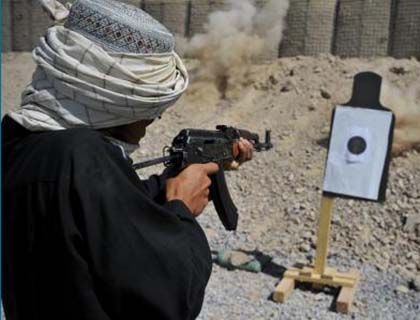Afghan-Taliban peace negotiation was one of the most controversial issues for long which put Afghan government in collision course with people. Afghan government left no stone unturned in gaining peace through negotiation, however, all the time and energy spent seem to be in vain. The issue of terrorism remains as strong as ever before, and Afghan police and civilians lose their lives in deadly acts of terror. But the government sought no effective strategy for eradicating terrorism other than persisting on peace negotiation.
Civilian casualties were the second issue and the most tragic incident in the “war on terror” launched in 2001. Recently, it is a hot issue between Kabul and Washington which has led to strained relation. Afghan President blamed US soldiers in harsh tune repeatedly for killing noncombatants and called them to stop air strike and night raid on Afghans home which cause civilian casualties. For example, in an interview with Washington Post, President Karzai expressed his concern over this issue and said, “The relationship has been at a low point for a long time, at least since 2007, as far as Afghanistan is concerned and the Afghan president is concerned. It began to deteriorate with the civilian casualties and the neglectful attitude toward my complaints about it. In 2007, we had the most serious incident of civilian casualties in Herat province of Afghanistan, when things turned very difficult between us, and since then it has not recovered.”
Moreover, war on terror which was launched by US forces along with its NATO allies seem to met failure. In a recent survey conducted in America shows that 40 to 50% of American respondents have said that US forces met failure during their long presence in Afghanistan. According to this survey, Washington could not reach its objective and failed in its counter-terrorism mission in the country. However, just 38% says that US gained victory in Afghan war.
Let us see the view about Afghan political issues expressed by the late Afghan intellectual, Muhammad Qasim Akhgar, who passed away in January 28th, 2014. Mr. Akhgar was an author and human rights activist, who maintained his integrity in the difficult tide of post-2001 events, he believed in a pluralistic Afghan democracy but also clearly saw the problems his country was facing.
Akhgar supported the presidential system but, at the same time, criticized administrative corruption and the lack of the rule of law in Afghanistan. He sharply opposed when ways around existing law and institutions were taken, as in the aftermath of the 2010 parliamentary elections when President Karzai tried to cut through the counting mess with a special tribunal. He was also critical of Karzai’s attempts to talk to the Taliban. “The president's definition of the Taliban and talks with the group has never been transparent and specific. Gulbuddin Hekmatyar, Mullah Omar…have committed several crimes against the people. How can the president speak of negotiations with these people? They should first of all be prosecuted and punished.” He also pointed out that “[political] differences and corruption” are resulting in a “weak position” for any negotiations.
While openly critical of Pakistan’s support for the Taliban, he spoke in favor of relations with the eastern neighbor as early as 2006. That the Afghan government called Pakistan its enemy and brother “in a single breath” was unreasonable to him. Instead, Akhgar suggested, "The government should bring consistency in its policy vis-à-vis the neighbors and assure them that the present set up was more friendly towards them as compared to the previous ones,” referring to the strained relations over the Pashtunistan issue during the monarchy and the 1973-78 Daud republic.
Akhgar was convinced that “the presence of ISAF troops has prevented possible war”, but he also said that the many civilian deaths caused by foreign troops as well as “abusing detainees' rights, or torturing prisoners … encourage people toward the Taliban and give the Taliban a chance to turn the situation to their advantage." He noted that Afghans did not expect human rights violations from the US military: “Violating human rights and torturing people is the emblem of Taliban and terrorists, but not the emblem of soldiers of US army.” He also criticized Western nations for their lack of a clear and transparent strategy. In early 2009, concerning the US surge, he said, “Boosting troops is not the solution. If the US wants to win the war in Afghanistan it has to change the strategy and parallel to military operations has to accelerate the reconstruction process and bring change to the living standard of Afghans, otherwise the instability would continue for the years to come.” He added that Western governments “need to coordinate among themselves and with the Afghan government their military, political and development programs. Otherwise, we will have more failures in the future in Afghanistan.”
President Karzai also criticized US policy in counter-terrorism. He said to Washington Post that secondary to civilian casualties there are also other issues. He pointed out that the private security firms, the parallel government structures, the contracts given to people, to individuals, causing corruptions. He added, “In a deeper way, reflecting a deeper lack of agreement between us, the way the so-called war on terror was fought. The sanctuaries were left alone outside Afghanistan and Pakistan, but the civilian villages were attacked. So when I say civilian casualties and when I say the incorrect strategy, the attack on the Afghan villages, that is exactly the crux of the difficulties.’’
I can say that both the strategies; war on terror and peace negotiation failed and one of the reason behind such failures are the disagreements between Afghan and US officials. For example, US soldiers fight against them but Afghan officials make peace or one side arrests the Taliban militants and the other side releases them. Hence, in such a case failure is beyond doubt.

